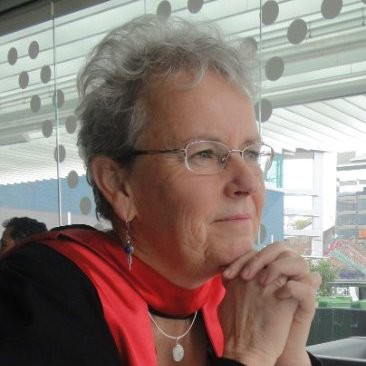




A view from a different place
Last Christmas, longstanding Inspiring Communities team member, Margy-Jean Malcolm, stepped out and into a new stage of community life in her new home town of New Plymouth. With a lifelong commitment to community development that spans back to the 1970s in Wellington, we want to acknowledge the huge contribution that Margy-Jean has made to understandings and practice of community development here in Aotearoa. Her various professional and volunteer roles have seen her inspire, guide and support communities and leaders right across the motu, with her generosity of spirit, time and wise counsel appreciated by many.
As I ‘rewire’ my life into a new season, I am enjoying deeper involvement in my local community. I love having my hands in the soil at our maara kai/community garden, the people I meet and how we are slowly weaving relationships to support learning, social inclusion and hauora there. I am struck by how important this community bumping place is for enabling me and other newcomers to feel a sense of belonging in Taranaki.
The maara kai epitomises all the messiness of community-led development (CLD). Our dreams for the maara are bigger than our human capacity to immediately achieve them. The garden can easily get overgrown. Weather, life and many unknowns often interfere with plans. Yet there is a life force, a mauri, that keeps on giving – literally seeds in the undergrowth that surprise us with crops we hadn’t planted or people who just turn up to help. This reminds me of the eco-cycle of nature and all living eco-systems. Supporting that life force are the special human connections across all our differences that are joyful, life-giving and growing healthy kai and relationships.
When I am grieving for the world – so ably described by Mike Joy as our gross overconsumption of natural resources and the lack of responsibility taken by those with the greatest wealth for their disproportionately large share of ecological overshoot impacts – let alone the human impacts of colonisation and inequity – my time in the maara gives me a deep sense of active hope.
Joanna Macy explains how active hope is a practice, something we do, not just an attitude of hopefulness. Active hope is a practice where we tune into what we most deeply value, honour our grief for the world, surface our hopes for a better future and commit to meaningful actions at personal, community and wider systems level in the present. She puts words to why I can never ‘retire’ from CLD because such active citizenship is life-giving and joyful.
I’m part of a group that shares kai, conversation and mending skills. It’s not just about the clothing that gets mended and saved from the landfill, but also the intergenerational conversations that spark support for each other in our submissions to Council and other climate/social justice actions – and the fun we have together. As Niki Harre has taught us, positive emotions are an essential motivating energy in our work for sustainability. We are not as developed as Stitch Kitchen or Upsewing Taranaki but there is something simple, special and sustainable about the energy of our small group.
Here in New Plymouth at the moment, there is a groundswell of fear and angry local resistance to new safe cycleways and other active transport initiatives. I admire Valarie Kaur’s work, who reminds me of the fearlessness of our ancestors, and challenges me to keep exercising my will to wonder, to see no stranger, even when someone is raging against initiatives I feel are urgently needed. I think we need more community bumping places that facilitate learning, listening, dialogue or just being together to help us get beyond ‘them and us’ and encourage a commitment to search together for real possibilities for a more just, sustainable future.
I have many fears too, about climate change, growing inequity, racism, violence and more. Yet I get sustained by the shifts I have seen over the last 50 years in Treaty settlements, iwi/hapū/whānau development, social inclusion, CLD practice. I get excited by current stories like:
- Dunedin’s Super Bowls providing affordable healthy food and a great community bumping place
- Dwell, working steadily over more than 40 years building a community housing portfolio of affordable quality homes in Wellington, where people are supported to thrive
- A recent local co-governance wananga here in Taranaki, providing a place for learning about Te Tiriti o Waitangi and better understanding the ‘super awesome origins of co-governance’
- The history-making Taranaki Maunga settlement this month
These initiatives continue to show us how community-led action can feed hope and hope can feed action. In the process we discover more joy than fear, and at its best, a shifting consciousness towards new ways of doing, thinking and being that are more life-giving for everyone. It is a long journey as tangata whenua know all too well in work for Te Tiriti justice.
I want my mokopuna to have lived experience of the joys of living simply, of being part of community-led action adventures, of finding our inner strengths and from working with a diversity of other good humans. I am deeply grateful for what I learn about those values and practices from previous generations of my whānau and the many awesome CLD practitioners and others I am privileged to meet and work with, albiet now, from a different place.
Margy-Jean Malcolm

